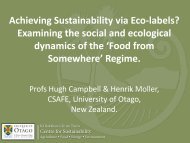Book of Abstract (incl. addendum) - IFSA symposium 2012
Book of Abstract (incl. addendum) - IFSA symposium 2012
Book of Abstract (incl. addendum) - IFSA symposium 2012
Create successful ePaper yourself
Turn your PDF publications into a flip-book with our unique Google optimized e-Paper software.
Workshop 1.2 Family Farms as Educational Farms – Possibilities and Perspectives<br />
back at the school, e.g. in different subjects or interdisciplinary projects. The third and fourth types <strong>of</strong><br />
collaboration are longer; enabling children to follow the seasonal growing cycle and be active on the<br />
farm e.g. by having a small plot, where they can grow potatoes. Teachers organize the visits with a<br />
farmer over a growing season, but other schools, even municipalities, have a formalized long-term<br />
collaboration with a farm.<br />
Preliminary findings suggest that teachers and farmers have quite different learning goals and<br />
values. Farmers are highly motivated, believing it is important that children connect to food<br />
production, understand the connectedness in nature, that our actions have an impact and that people<br />
have a choice, but it is also a means for farmers to present and bring about an understanding <strong>of</strong><br />
(conventional or organic) agriculture in the public. Teachers' objectives are linked to subjects and<br />
ministerial requirements. Some have a broader focus on developing children’s action competence,<br />
critical thinking and food citizenship. Yet some teachers lack knowledge, motivation and time, limiting<br />
the integration in the classroom.<br />
Collaboration between farms and schools in Sweden – what does it take to<br />
succeed?<br />
Christina Lundström and Magnus Ljung<br />
Swedish University <strong>of</strong> Agricultural Sciences, Sweden<br />
Christina.Lundstrom@slu.se<br />
In the new curriculum for the Swedish comprehensive school, there is on one hand few formal<br />
demands regarding teaching <strong>of</strong> agriculture and food production, but on the other hand great<br />
opportunities to use these contexts for learning in several subjects. The question is how this potential<br />
can be utilized? Our study shows that teachers believe that it is important that students know how our<br />
food is produced, and many teachers would like to learn more about farming and food production.<br />
Teachers believe that the teaching <strong>of</strong> agriculture and food production should <strong>incl</strong>ude food security and<br />
recycling, and how to decrease environmental impacts. Furthermore, teachers reckon that pupils ought<br />
to have an opportunity to grow food in school, and believe that skills as responsibility, cooperation and<br />
problem solving can be developed through practical work on a farm. Nevertheless, few teachers visit<br />
farms with their pupils and if they do - it is occasional visits. Instead, teaching <strong>of</strong> agriculture and food<br />
production, are carried out as briefings, discussions or by studying books or the Internet in classroom<br />
settings. Although the area is considered important and the teachers see many opportunities, they do<br />
not exploit the potential they see.<br />
The structural obstacles are large and the added value is not clear. The farms who see educational<br />
activities as an exciting area <strong>of</strong> development must therefore take an active role in the implementation<br />
process. This article discusses the characteristics <strong>of</strong> the entrepreneurs who nevertheless have managed<br />
to reach school and translate good intentions into action - collaborations truly systemic and unique in<br />
its nature. Further, what makes the partnership come into place? Which <strong>of</strong> the school's challenges does<br />
farm cooperation help to deal with and how is the work rooted in the curriculum? Based on three case<br />
studies tentative conclusions are drawn that we hope will support other farmers in their ambitions to<br />
bring about tangible interactions.<br />
Measuring interest in agriculture – A pilot study <strong>of</strong> a project on the role <strong>of</strong><br />
school farms and subsequent curricular teaching units<br />
Malte Bickel and Susanne Bögeholz<br />
Georg-August-Universität Göttingen, Germany<br />
Mbickel@gwdg.de<br />
Agriculture becomes increasingly important due to its impact on environment, biodiversity and climate<br />
change. Structural changes in farming have tremendously diminished the number <strong>of</strong> farms, farm<br />
22











